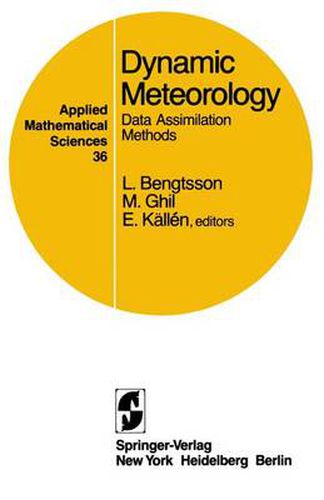Readings Newsletter
Become a Readings Member to make your shopping experience even easier.
Sign in or sign up for free!
You’re not far away from qualifying for FREE standard shipping within Australia
You’ve qualified for FREE standard shipping within Australia
The cart is loading…






This title is printed to order. This book may have been self-published. If so, we cannot guarantee the quality of the content. In the main most books will have gone through the editing process however some may not. We therefore suggest that you be aware of this before ordering this book. If in doubt check either the author or publisher’s details as we are unable to accept any returns unless they are faulty. Please contact us if you have any questions.
One of the main reasons we cannot tell what the weather will be tomorrow is that we do not know accurately enough what the weather is today. Mathematically speaking, numerical weather prediction (NWP) is an initial-value problem for a system of nonlinear partial differential equations in which the necessary initial values are known only incompletely and inaccurately. Data at the initial time of a numerical forecast can be supplemented, however, by observations of the atmos phere over a time interval preceding it. New observing systems, in particular polar-orbiting and geostationary satellites, which are providing observations continuously in time, make is absolutely necess ary to find new and more satisfactory methods of assimilating meteorological observations - for the dual purpose of defining atmospheric states and of issuing forecasts from the states thus defined. FUndamental progress in this area has been made in recent years and this book attempts to give a review and some suggestions for further improvements in the field of meteorological data assimila tion methods. The European Centre for Medium Range Weather Forecasts (ECMWF) every year organises seminars for the benefit of meteorologists and geophysicists of the ECMWF Member states. The 1980 Seminar was devoted to data assimilation methods, and this book contains selected lectures from that seminar. The purpose of the seminar was twofold: it was intended to give a basic introduction to the subject, as well as an overview of the latest developments in the field.
$9.00 standard shipping within Australia
FREE standard shipping within Australia for orders over $100.00
Express & International shipping calculated at checkout
Stock availability can be subject to change without notice. We recommend calling the shop or contacting our online team to check availability of low stock items. Please see our Shopping Online page for more details.
This title is printed to order. This book may have been self-published. If so, we cannot guarantee the quality of the content. In the main most books will have gone through the editing process however some may not. We therefore suggest that you be aware of this before ordering this book. If in doubt check either the author or publisher’s details as we are unable to accept any returns unless they are faulty. Please contact us if you have any questions.
One of the main reasons we cannot tell what the weather will be tomorrow is that we do not know accurately enough what the weather is today. Mathematically speaking, numerical weather prediction (NWP) is an initial-value problem for a system of nonlinear partial differential equations in which the necessary initial values are known only incompletely and inaccurately. Data at the initial time of a numerical forecast can be supplemented, however, by observations of the atmos phere over a time interval preceding it. New observing systems, in particular polar-orbiting and geostationary satellites, which are providing observations continuously in time, make is absolutely necess ary to find new and more satisfactory methods of assimilating meteorological observations - for the dual purpose of defining atmospheric states and of issuing forecasts from the states thus defined. FUndamental progress in this area has been made in recent years and this book attempts to give a review and some suggestions for further improvements in the field of meteorological data assimila tion methods. The European Centre for Medium Range Weather Forecasts (ECMWF) every year organises seminars for the benefit of meteorologists and geophysicists of the ECMWF Member states. The 1980 Seminar was devoted to data assimilation methods, and this book contains selected lectures from that seminar. The purpose of the seminar was twofold: it was intended to give a basic introduction to the subject, as well as an overview of the latest developments in the field.